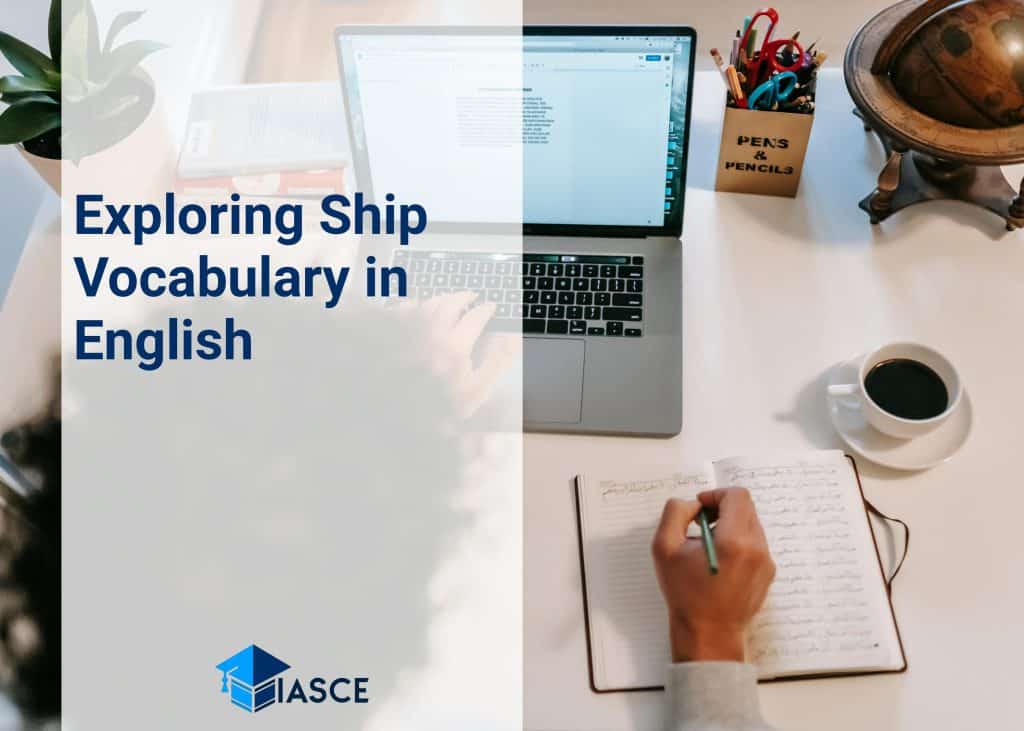When it comes to the English language, there’s a fascinating world of vocabulary waiting to be discovered. One area that often goes under-explored is ship terminology. I’m not just talking about basic nautical terms like ‘port’ or ‘starboard’. Instead, my focus today is on ship-related words and phrases that have sailed into everyday usage.
The way we use these maritime expressions can have deep grammatical implications, subtly shaping our conversations without us even realizing it. From “learning the ropes” to “steering clear” of trouble, I’m here to guide you through an ocean of linguistic intrigue.
So tighten your life vests, as we embark on this exciting journey together! We’ll explore how ship vocabulary has influenced English language usage and dive into their grammatical implications. You’re in for a voyage of discovery!
Understanding Ship Terminology: A Grammatical Perspective
Diving into maritime language, it’s clear that ship terminology has its own unique vocabulary and grammar. Let me guide you through some fascinating aspects of this specialized lexicon.
In English, ship lingo often involves words with a different meaning on land than at sea. Take ‘bow’ for instance. On land, ‘bow’ might refer to bending forward in respect or a decorative knot tied with ribbon. At sea though, the ‘bow’ is the front end of a ship.
Now let’s get technical about grammatical implications. Grammar isn’t just about sentence structure; it also affects how we understand individual terms within those sentences. So when I say ‘aboard’, what comes to mind? It’s not just getting on a ship but also being part of the crew or even cargo loaded onto the vessel.
But wait, there’s more! In nautical parlance, using correct verbs can be crucial too. For example:
- To dock refers specifically to bringing a boat into dock.
- To moor, on the other hand, means to secure a boat in place while still in water.
See how subtle differences can shift our understanding?
And then we have terms like ‘port’ and ‘starboard’. They mean left and right respectively when facing towards the bow (front) of the ship but these terms are unchanging regardless of where one stands onboard unlike their terrestrial counterparts.
This special vocabulary isn’t just about semantics either; it serves practical purposes too – avoiding confusion and promoting clear communication among seafarers especially during crucial times aboard ships.
Ship jargon is truly an intriguing mix of old traditions and modern precision – from commanding vessels across vast oceans to docking them safely at port. And as much as it seems complex initially, once you’ve grasped these terminologies, they’ll come naturally to you whenever you’re navigating your way through any maritime discourse or literature!
Implications of Ship Vocabulary in English Language Usage
Diving into the sea of ship vocabulary, I find it astounding how it has influenced English language usage. Nautical terms haven’t just stayed on deck; they’ve sailed smoothly into our everyday conversations and writings.
Take for example the term “loose cannon.” Originally referring to a dangerously unsecured cannon on a ship’s deck, today we use this phrase to describe an unpredictable or uncontrollable person. Or consider “batten down the hatches,” which originally meant securing a ship’s hatch-tops before a storm. Nowadays, we’ll say it when bracing ourselves for any upcoming difficulty.
Here’s a table that presents some other nautical phrases that have made their way into common English parlance:
| Ship Terminology | Common Usage |
|---|---|
| In the doldrums | In low spirits/ lack of activity |
| Slack water | A period of little activity |
| Taken aback | Surprised or shocked |
Words matter, especially in the world of ships where clear communication is key. Misunderstanding can lead to accidents – so maritime language became standardized. This uniform lingo evolved over time and seeped into our day-to-day life.
Moreover, many words we regularly use were born out of necessity on ships. For instance:
- ‘Starboard’ and ‘port’ are used instead of ‘right’ and ‘left.’ Why? Because these directions can become confusing on a moving vessel.
- ‘Aft,’ ‘bow,’ ‘stern,’ all these specific terms came from sailors needing precise terminology to refer to different parts of the ship.
Finally, let’s not overlook how this influence extends beyond individual words and phrases. The structure and syntax used in mariner lingo have also had impacts on broader English grammar rules.
For example:
- The use of double negatives (“I ain’t no fool”) was common among sailors and has found its way into various dialects.
- Even sentence structures like “Are you going ashore?” instead of “Do you go ashore?” come from sailor speak!
So there you have it – while we may not always notice it, our daily chats are peppered with pieces from old-time sailors’ chit-chats!
Conclusion: Merging Nautical Vernacular with General English
Sailing through the vast ocean of nautical vernacular, I’ve shown how it intersects with general English. This journey has shed light on how sailors’ language has anchored itself in everyday conversations.
Maritime terms like “loose cannon”, “know the ropes”, and “wide berth” have sailed smoothly into our daily dialogue. We use these phrases without realizing their seafaring origins! These examples highlight the influence of ship vocabulary on our speech.
Now, let’s take a minute to appreciate the grammatical implications that come along. We noticed that most nautical idioms are used as metaphors in general English, adding richness to our language. Here’s a quick recap:
- Loose Cannon: An unpredictable or uncontrolled person
- Know The Ropes: To understand the details of an operation
- Wide Berth: To keep at a safe distance
This integration reflects not only linguistic evolution but also cultural exchange between seafarers and land dwellers.
While we’ve covered some ground (or should I say sea?), there’s always more to explore in the depths of language usage and grammar. So next time you’re deep in conversation, remember – every word has its own voyage! Happy sailing through your lexiconic journey!

